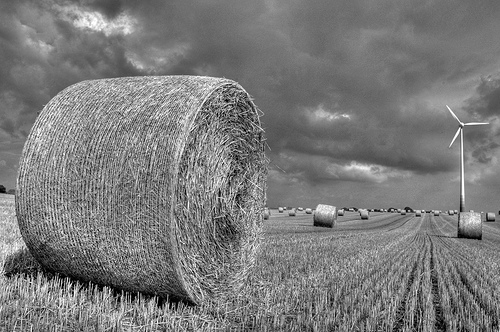The Brand Catwalk – Good Energy

Image courtesy of Hans van Reenen
Brands help businesses fight the inexorable drift towards commoditisation – the point at which consumers can’t tell the difference between the offerings in the marketplace and can only choose on price.
And you don’t get much more commoditised than the UK energy market, where there is the square root of sod all to differentiate the miserable operations that try and claw out an existence in this market.
So price rules, especially in times of high wholesale energy prices.
However, there is one corner of the market where real difference is starting to emerge – green electricity tariffs and suppliers.
Green tariffs and suppliers allow people to chose between energy brands on something other than price – largely for people that want to cut their carbon footprint faster than their electricity bills. They do this by ensuring that for every unit that their customers consume a unit of renewable green energy is put into the system, displacing non-renewables over time.
All well and good.
However, rather unfortunately, the green tariffs have got a bit of a bad name recently. Largely because big electricity suppliers have a tiny minority of customers on green tariffs and therefore are still kicking seven types of shit out of the atmosphere. Indeed Greenpeace recently pulled their endorsement from N Power’s ‘Juice’ tariff on this basis. If you have been seduced by N Power there is rather a good article about this on Julian Cope’s Head Heritage site.
So you are better off sticking to one of the Green suppliers – however, rather infuriatingly many of these still draw some of their electricity requirements from non-renewables.
Just when you were about to give up on trying to be good, buy an SUV and sell your children into slavery, riding to the rescue for the ethical consumer comes (drum roll) Good Energy.

Founded in 1999 Good Energy is the only electricity supplier in the UK that offers 100% renewable generated electricity. The power for their 21,000 customers comes from over 250 small to medium renewable generators that run on wind, small scale hydro, wave, solar and sustainable biomass.
And if you start to micro-generate for your own use they will pay you for any surplus you produce and, bizarrely, pay you for simply generating and consuming electricity yourself – incentivising your good behaviour even if it doesn’t benefit their bottom line.
No to mention that their identity is rather nice and their web experience is very simple. Indeed signing up is a piece of absolute piss.
I should just mention that this stuff is priced at a real premium.
However, the sign of a healthy brand is if it can justify and sustain a premium over the competition. And what price getting your Carbon footprint down into children’s sizes? Apparently I’m going save 3,000Kgs of carbon a year with Good Energy, a reason for a moderate amount of smugness.
Plus if you do sign up they send you a bottle of Organic Red Wine to say thankyou – how on brand is that?
The environmental NGOs now fight shy of endorsing or ranking Green tariffs and suppliers and some people are critical that they are not building new renewable capacity themselves but Good Energy comes recommended by the Ethical Shopping Good Energy Guide and Innocent Smoothies.
Good Energy are a tiny but rather dynamic little brand in a sea of unedifying badness and blandness, building for themselves a customer base that will be a damn sight more stable and rewarding than that of the big energy suppliers. And hurrah for that.
Discover more from
Subscribe to get the latest posts sent to your email.

Terrific. I’m sold.
In some ways you can say the same thing about the fast growing health food market. Instead of feeling their money is paying for their carbon footprint, they are feel they are paying for the prevention of things which can cost them in the end in more then just monitary way.
In Sweden there’s a company that been around for the last couple of years called God El – translates to (drum roll) Good Electricity. They claim to be the world’s first good electricity company. They give all profit to charity and they are certified with an ecolabel from The Swedish Society for Nature Conservation.
I’ve, since I heard about God El, suspected however that there’s still a possibility that their offer is so nicely wrapped up as being a good cause company that people still their conscious just being a customer of GodEl – that they don’t find it necessary to pay the extra bucks for the ecolabeled electricity/green tariff. And since they are not a producer of electricity but just a broker, you cannot know from where the electricity comes from. But since they give all the profit to charity, perhaps the end justifies the means. Even though they don’t break even yet!?
Anyway, reading about this Good Electricity company is terrific. Finally an electricity company interested in making good, not just profit.